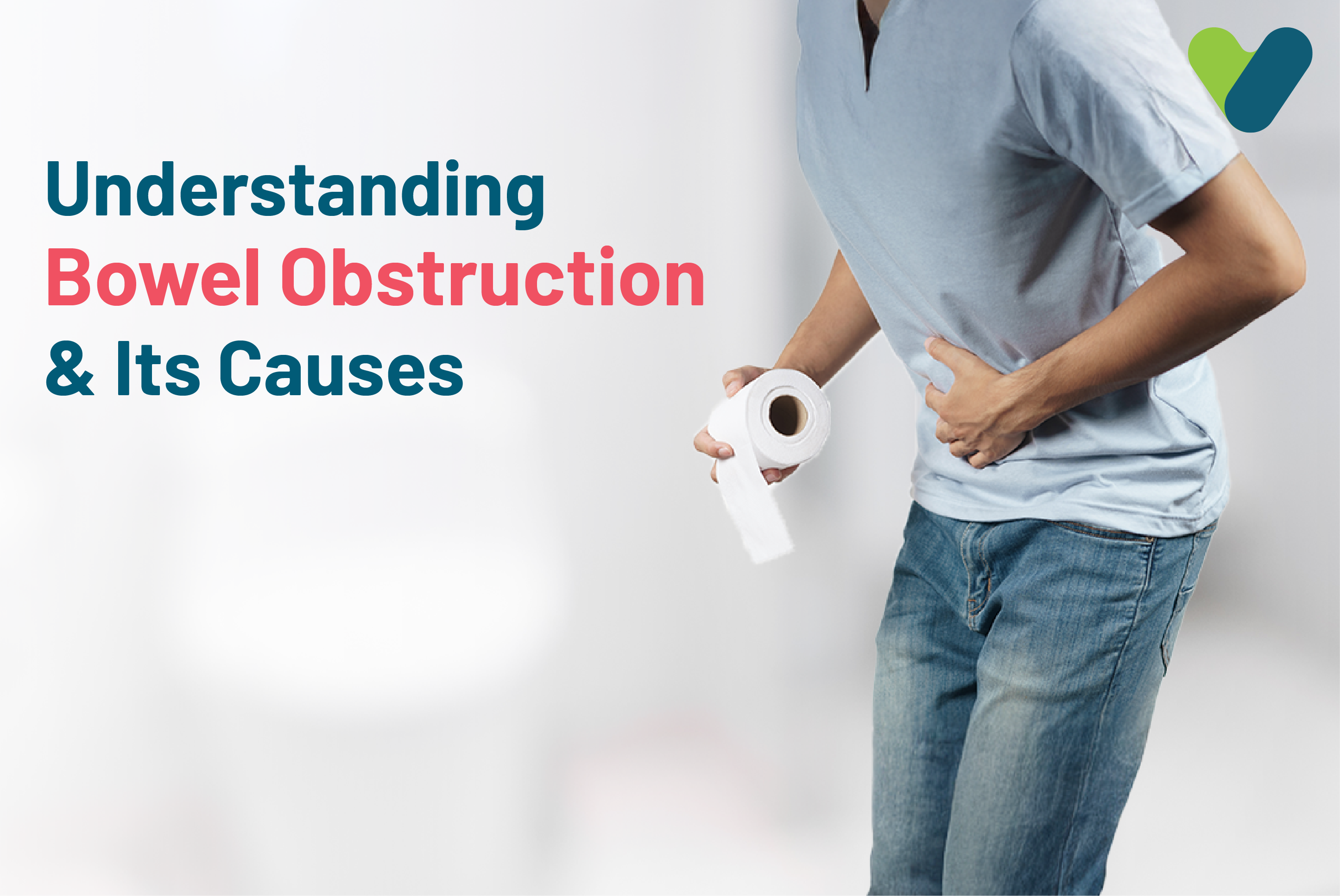Bowel obstruction is a severe medical disorder in which the typical passage of intestinal contents is either partially or completely disrupted. This blockage can occur in the small or large intestine, and if left untreated, it may lead to severe complications such as intestinal perforation, infection, or even death.
What Is a Bowel Obstruction?
An intestinal obstruction occurs when food, fluids, and gas cannot pass through the intestines normally. The obstruction could be mechanical (a physical blockage) or functional (a result of disturbed muscle activity in the intestines). While mechanical obstructions are more prevalent, particularly in the small intestine, functional obstructions can occur after surgery or due to drug side effects.There are two kinds of obstructions:
- Small Bowel Obstruction (SBO)
- Large Bowel Obstruction (LBO)
Common Bowel Obstruction Causes
Bowel obstruction can occur due to two basic mechanisms: mechanical blockage or intestinal functional impairment.Mechanical Causes.
A mechanical blockage is a physical barrier that partially or completely prevents the flow of contents through the intestine. Common mechanical causes are:- Post-operative adhesions (scar tissue from previous procedures)
- Hernias (intestinal loops that protrude through weakened abdominal muscles)
- Impacted stool (severe constipation resulting in obstruction).
- Intussusception (a part of the gut telescopes into another, commonly seen in children)
- Volvulus (twisting of the gut and cutting off blood supply)
- Cancerous or non-cancerous growths in the intestines can physically obstruct the passage of food and waste.
- Foreign bodies (swallowed objects, producing a blockage)
- Gallstones (rare, but can block the gut)
- Crohn's disease is an example of an inflammatory bowel disorder
Functional Causes (Ileus)
Functional bowel obstruction, also known as ileus, occurs when the intestinal muscles fail to contract efficiently, preventing the flow of contents without a physical blockage.A particular kind, paralytic ileus (also known as pseudo-obstruction), is widespread in infants and children and can be caused by:
- Gastroenteritis is an intestinal infection caused by bacteria or viruses.
- Electrolyte abnormalities, specifically low potassium levels
- Recent abdominal surgery.
- Reduced blood flow in the intestines
- Appendicitis is a type of intra-abdominal infection
- Chronic kidney or lung illness.
- Certain drugs, particularly opioid painkillers (narcotics)
Bowel Obstruction Symptoms
Bowel obstruction symptoms vary based on the location (small or large bowel) and severity of the blockage. They might grow quickly or gradually. Recognizing these indicators early is critical for proper diagnosis and treatment.The common symptoms of the bowel obstruction are:
- Cramping stomach pain is intermittent and intense, usually escalating with time.
- Abdominal swelling or distention is more noticeable in people with substantial intestinal obstruction.
- Abdominal fullness or pressure is a persistent sensation of bloating or tightness.
- Gas accumulation and difficulty passing gas are indicators of complete obstruction.
- Constipation is the complete absence of bowel motions in severe blockages.
- Diarrhea may still occur in cases with partial small intestinal obstruction since liquid stool bypasses the blockage.
- Nausea and vomiting are more prevalent and severe in small intestinal blockages; in advanced cases, the vomit may contain bile or feces.
- Foul-smelling breath
Tests and Diagnosis of Bowel Obstruction
The diagnosis relies on a combination of clinical examination and imaging studies:- Physical examination: It may reveal either high-pitched or nonexistent bowel sounds, depending on the type of obstruction.
- Abdominal X-ray: Initial imaging detects dilated bowel loops and gas patterns.
- CT Scan: Provides detailed images that confirm the level, cause, and severity.
- Ultrasound: It is commonly utilized in youngsters and pregnant women.
- Blood tests can detect indicators of illness, electrolyte abnormalities, and dehydration.
Bowel Obstruction Treatment
The kind, location, and degree of a bowel obstruction determine how it is treated. Hospitalization and supportive measures are commonly used in the initial stages of care.Nonsurgical Treatment
Most partial small bowel blockages and some total obstructions can be treated without surgery.- Insert a nasogastric tube to relieve pressure, gas, and vomiting.
- IV fluids to avoid dehydration and restore electrolyte balance
- Bowel rest (nothing by mouth) allows the intestines to relax.
- Pain relief, anti-nausea drugs, and antibiotics if an infection is present.
- Therapeutic enemas or stool softeners for blockage caused by impaction.
Surgical Treatment
Surgery is essential for total intestinal obstruction or strangulated bowel, when nonsurgical therapy fails, or when a tumor, volvulus, or hernia is the cause of the blockage.Surgery options include:
- Removal of the obstructed portion of the bowel.
- Repair of hernias or strictures.
- Adhesiolysis is the removal of scar tissue that causes blockage.
- Strictureplasty for Crohn's disease-related narrowing.
Risk Factors and Complications of Bowel Obstruction
If not treated, bowel obstruction can cause serious health problems. Understanding the risk factors and associated complications is critical for quick intervention and successful intestinal obstruction treatment.Risk Factors:
- Previous abdominal or pelvic surgery, which may create adhesions (a primary mechanical reason)
- Crohn's disease causes the gut wall to thicken and narrow.
- Abdominal or gastrointestinal malignancies can restrict the intestinal tract.
- Hernias trap bowel segments.
- Volvulus, or twisted intestines, particularly in older persons.
- Chronic Inflammatory Bowel Diseases
If left untreated, intestinal blockage can cause significant consequences, such as:
- A perforation is a hole in the gut that can cause peritonitis.
- Sepsis is a life-threatening response to infection.
- Tissue death is the loss of blood flow to a portion of the intestine.
- Electrolyte imbalance: Caused by vomiting and dehydration.
Preventing Bowel Obstruction:
While not all cases can be prevented, numerous strategies can lower the risk:- Dietary fiber helps to avoid constipation and fecal impaction.
- Regular checks are recommended, especially for persons who are at risk of developing colorectal cancer.
- Post-surgical treatment aims to reduce adhesion formation.
- Managing chronic disorders like Crohn's and diverticulitis.
Reference:
Medical News Today - https://www.medicalnewstoday.com/articles/324037#overview


